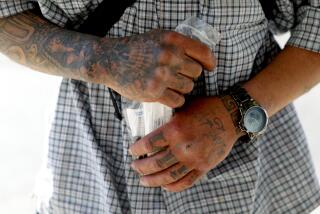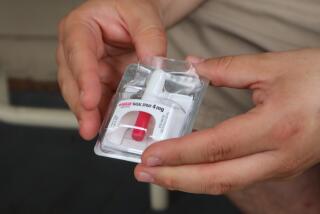Nonprescription Sale of Needles to Be Considered
- Share via
A bill to be considered by the Assembly Health Committee today would allow adults 18 and older to buy up to 30 hypodermic needles or syringes at licensed pharmacies without a doctor’s prescription.
“The purpose of the bill is to save lives in California,” said Sue North, chief of staff for its author, state Sen. John Vasconcellos (D-Santa Clara).
The bill has passed in the Senate, although Gov. Gray Davis has not taken a position on it. Supporters, including health-care organizations and the pharmacy industry, said that allowing over-the-counter needle and syringe sales would reduce the spread of HIV and hepatitis B and C among drug users, saving millions of dollars in health-care costs.
State law now requires a prescription to buy needles unless they are used to inject insulin or adrenaline.
The law also requires a pharmacist to see valid identification and keep a detailed record of nonprescription needle sales. California is one of six states that require a prescription to buy a syringe.
Lifting the prescription requirement would ease the demand on the limited resources of needle-exchange programs, which operate mostly under the jurisdiction of local governments and allow addicts to exchange used needles for clean ones without a prescription, said Sara Nichols, legislative advocate for the California Nurses Assn.
Opponents of the bill, mainly law enforcement organizations, argue that it allows for easy access to needles and that it condones drug use.
Unlike the policies of needle-exchange programs, the bill does not mandate that dirty needles be brought in for new ones.
“In a needle exchange, there’s government oversight,” said John Lovell, legislative counsel for the California Narcotics Officers Assn. “There you can do other things designed to intervene in someone’s drug habit. At Long’s drugstore, Rite Aid, Walgreen’s, or the pharmacies in grocery stores, there is no oversight.”
North said the bill also would help those living in rural areas who don’t have access to needle exchanges.
In 1999, Davis signed into law a measure allowing local governments to approve needle-exchange programs only if the council members or supervisors declared a “public health emergency.”
There are 23 programs in the state, of which 15 are legalized by local government, said Ricky Bluthenthal, a sociologist at the Rand Corp., a think tank in Santa Monica.
Some drug users who use needle exchanges said the bill doesn’t do enough to prevent the spread of infectious disease.
“I believe this program is good because you benefit from classes,” said Jessica Olivas, 52, a heroin addict who has been coming to the needle-exchange program at the Bienestar center in Boyle Heights for five months.
“Because you have to bring in old needles, it stops needles from being in the trash where kids can get to them,” Olivas said.
More to Read
Sign up for Essential California
The most important California stories and recommendations in your inbox every morning.
You may occasionally receive promotional content from the Los Angeles Times.













